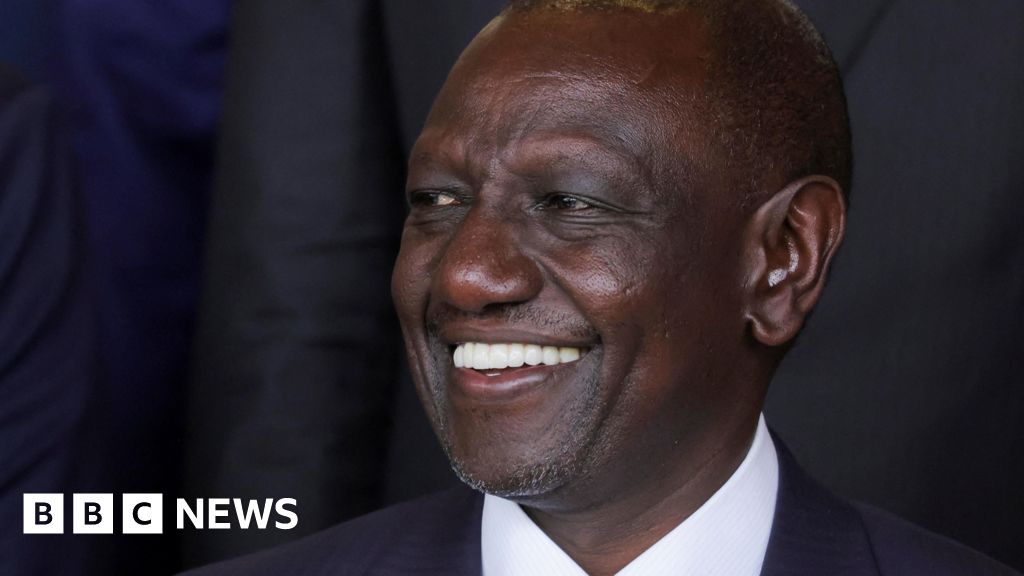Why does Kenya president attract many borrowed names
BBC News, Nairobi
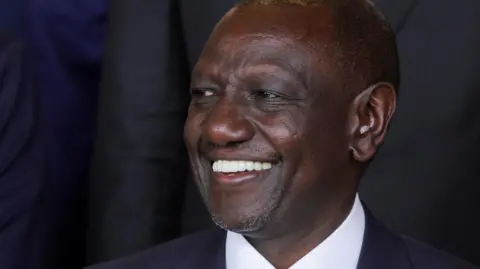 Reuters
ReutersKenya President William Roto is a man who has many borrowed names.
Jesus, El Chapo, a crowd and chicken seller is just some of what he gained in recent years.
As is often the case when people are given a substitute, some are affectionate, but some aim to ridicule and reflect deep anger.
The History of the President’s Nickname offers a window on how to change his perception.
Roto admitted the re -embarrassed direction, recently joking that the Kenyans “end” with many stickers.
“You gave me a lot of names. I had the name William Kembacirire Samawi Roto. I added the survivors … Zakayo … Now you are in Kasono (the title of the Congolese song about giving up a sorrow). He recently asked.
The crowd responded, in a gathering in the capital, Nairobi, that they have more.
Before his election as president in 2022, Roto attracted his reinforced handles as a man.
Hustler – a Kenyan language for someone who comes out of their lives against the possibilities – helped him as a person that would give priority to the needs of the struggling people.
The chicken seller, referring to his childhood when the poultry climbed on the side of the road, echoed with many of those who saw his life as their own example.
“This was very positive [names]. They sold him to the audience in terms of votes. ”Political analyst, Professor Hermann Manoura, told the BBC on the pretext that they helped put him in the higher position.
“The names are really sticking to Roto,” he added.
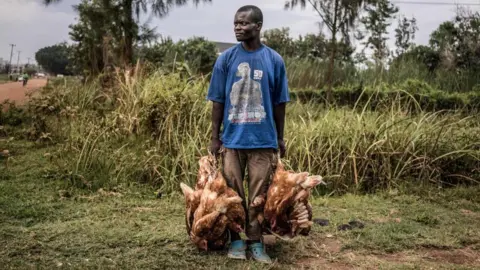 AFP / Getty Images
AFP / Getty ImagesBut the president was a high -level figure in Kenyan politics for a long time, including the work as a vice president for nine years until 2022, and he was never about the controversy.
Professor Mashamba – who translated into “Ibn Al Mazar” – has been made less than a decade and relates to Roto’s ownership of vast areas of land throughout the country. Fears about how to gain some of these.
In 2013, the Roto Court ordered the delivery of a 100 -acre farm (40 hectares) and to compensate a farmer accused of seizing it during post -election violence in 2007. He denied any violations.
Mel Roto also quoted the verses of the Bible, earned him by the deputy of Jesus.
However, the title manufacturers have worked on additional work since its ascension to the presidency – with the creation of at least dozens – and they became increasingly embellished.
One of them has emerged Zakayo – Swahili of Zaccheaus, the character of the Bible that is portrayed as a greedy tax collector climbing a tree to see Jesus.
The Roto government has operated a set of unpleasant taxes and many Kenyans began to say that he had betrayed the “fraudsters”.
“He failed to deliver after he became president,” said Professor Manura.
The pain of paying more taxes, and imagines that additional funds will be wasted, often the focus on many conversations.
Last year, the youth went out to the streets of Nairobi for weeks of protests, which turned fatal, against a new government proposal to raise the taxes that later decreased.
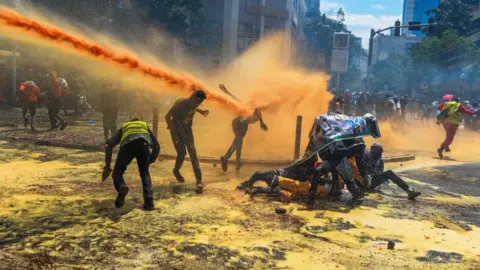 Anadolu / Getty Images
Anadolu / Getty Images“Ruto Must Go” has become a crowd invitation to the appearances, and now it must become another way to refer to the leader.
Creators also focused on the claim that the president has foreign travel.
Hence the title of Vasco Da Ganya – a play in the name of the Portuguese explorer in the fifteenth century, Vasco Da Gama, and Swahili Word Danganya, which means “lying”.
Roto’s sincerity has also been called with Kaunda UNGONAN, which mimics the late Congolese musician Kanda Bongoman.
The first part refers to the president’s love for Kaunda – Safari jacket with matching trousers – and uonganan, which includes the word UNONGOLA, which means “lies”.
But the president seems unacceptable to this calm of verbal attacks.
Government spokesman, Isaac Mora, said that the multiple titles “do not raise concerns” in the president’s office, but simply “pick up how people look at a person.”
Roto “is his hands and makes his best to transform the economy … It is natural that any leader has many borrowed names because this indicates his various features and initiatives as a leader.”
Mora also argued that despite the title of Zakayo, the government was forced to raise taxes to pay the costs of new projects, reduce the budget deficit and reform the economy.
However, when people exceeded the invention of new names and used satire and artistic forms of the president’s irony, there was a negative reaction from the officials.
Some cartoons and images created from artificial intelligence, including showing the president, were described as “reckless” and “others”.
Some of the alleged producers of this online content were victims of kidnapping. This, as Professor Manura said, should be seen as a sign of intolerance by the government.
Lachon Kiplimo, a 23 -year -old university student, said that, despite his support for the president, some of the promises he made are sometimes “unrealistic”, which feed the borrowed names, said Lachon Kiplimo, a 23 -year -old university student.
He pointed to the use of El Chapo, referring to the former Mexican drug head, after Ruto promised a machine that would produce a million Chapatis (also known as Chapo in Kenya) every day to feed school students in the capital.
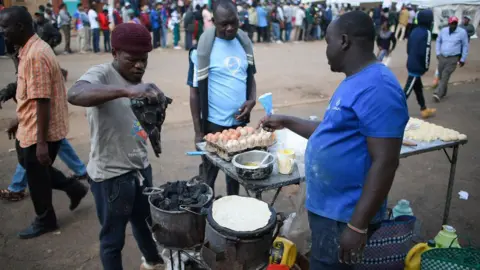 AFP / Getty Images
AFP / Getty ImagesHowever, Mr. Kepolimo believes that the way the president is brushing from the title of horoscopes, and it appears in reality that he embraces them, shows his strength.
Professor Manura believes that young people who reach alternative posters of the president do this as a form of venting, a way to release stress.
This 24 -year -old student Margaret Kahura is supported, who said that many Kenyans “suffer from great pain”.
She feels irony is a way to allow Ruto to know how young people feel.
She says that no other Kenyan president has been subjected to this level of irony, “so this is unique [but] Badly. “
It is true that the former heads of state have titles, but they were not much.
The last president, Ohuru Kenyatta, was called Camwana (“” Small Boy “), Jayden (Kenyan signal to a significant or lazy child) and Wamashati (for his love for printed shirts).
His predecessor, Mai Kibaki, was known as General Kegoya (a fearful general) and the fence present.
Perhaps the era of social media, with its uncomfortable appetite for the new content to keep people entertaining, has increased the trend towards calling the name.
But for many, like Mrs. Cahara, the size of the borrowed names of Ruto is a real reflection of the “different problems that people face”.
You may also be interested in:
 Getty Images/BBC
Getty Images/BBC